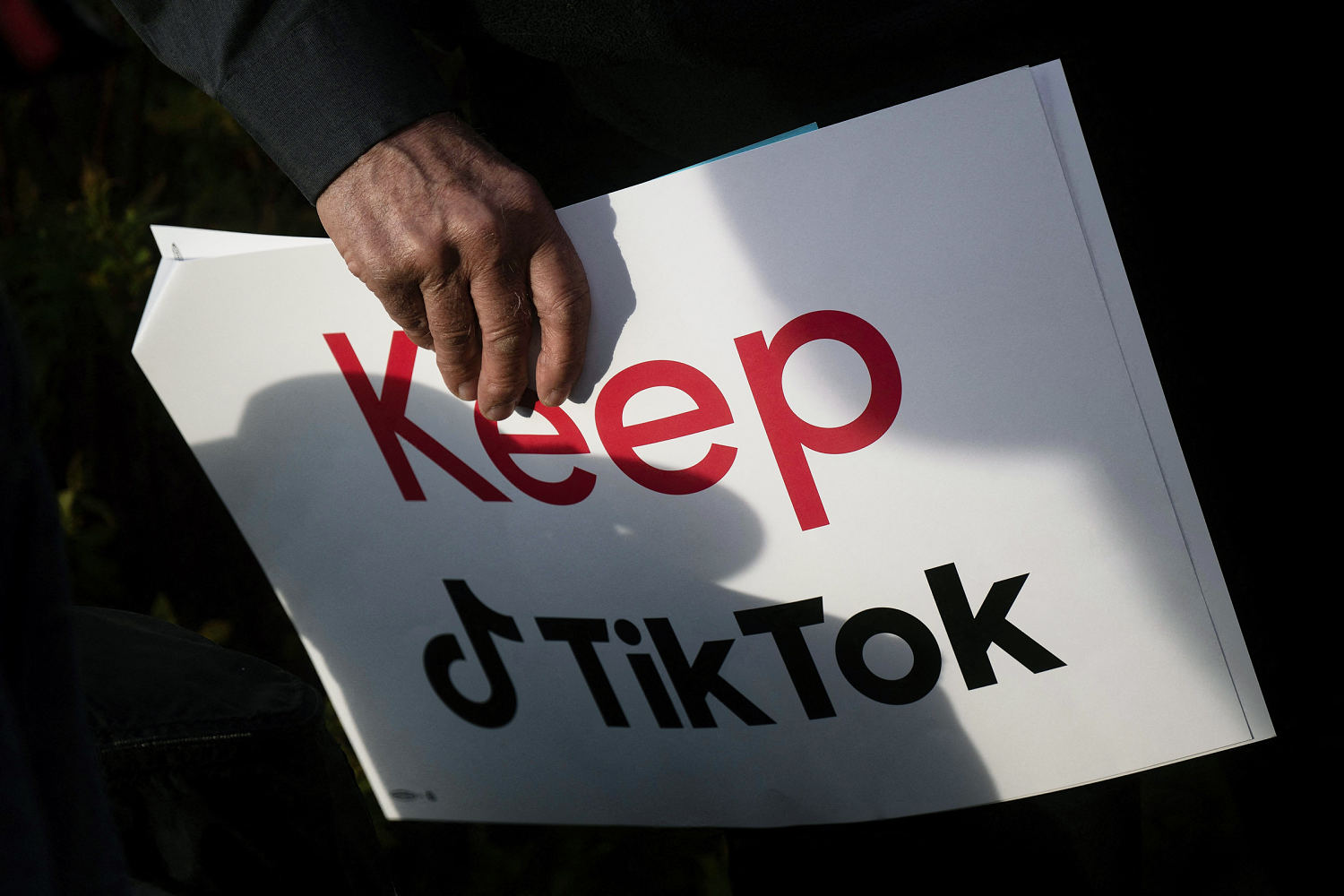Anxious about a looming TikTok ban, some American creators look to other platforms

The clock is ticking for American creators who say they are both nervous and frustrated as they prepare for a potential nationwide ban of TikTok next month.
A bipartisan bill President Joe Biden signed this year requires TikTok’s Chinese parent company, ByteDance, to sell the platform to an American company or face a ban — which is set to take effect Jan. 19, the day before President-elect Donald Trump takes office. The Supreme Court said it will take up TikTok’s appeal on Jan. 10.
“So many people have found connection, communities, and people’s livelihoods now have been built from TikTok,” said Jenn Ficarra, a Los Angeles-based writer who used TikTok to help launch a baby-name consulting business as a side hustle. “I’m just really dismayed and annoyed and angry that something that is instrumental to so many people’s livelihoods is being stripped away.”
Lawmakers who pushed for a ban argue that TikTok’s Chinese owner poses a national security threat to the United States. But for many American creators who’ve come to rely on it as their main source of income, losing it would mean scrambling for new ways to sustain their careers and rebuild their personal brands.
In recent weeks, hundreds of TikTok users like Ficcarra have lamented the looming ban, posting videos showcasing their anxiety, anger and grief as they prepare to lose access to it.
“There’s going to have to be sacrifices made, and it obviously does make me worry about everyday life, like groceries, rent, all those sorts of stuff,” said Jonathan Miller, a songwriter and music commentator who has been a full-time creator since 2010.
Creators like Miller — who have amassed followings on TikTok but aren’t necessarily considered household names — hope to pivot to other platforms to make up for the income they expect to lose from the potential ends of their TikTok careers.
In a court filing this month, TikTok claimed U.S. small businesses and social media creators would lose $1.3 billion in earnings within just a month of a shutdown.
TikTok is the most commonly used platform by brands that engage in influencer marketing, according to a recent report by the Influencer Marketing Hub, which also found that 50% of influencer marketers believe TikTok delivers the best return on investment for short-form video content. It has become a giant in the evolving creator economy, which includes millions of social media personalities who make money through brand deals, platform monetization and audience subscriptions. Research from Goldman Sachs last year predicted that the total market opportunity of the creator economy could reach $480 billion by 2027.
Cole Mason, a co-founder of the creator marketing company Pearpop, said he’s optimistic creators will adapt should there be a ban.
“Creators will be a powerful force behind our culture, with or without TikTok,” he said in an email. “Ultimately, where creatives go, audiences and brands follow.”
As they gear up for the reality of losing part of their regular incomes, some TikTok creators have already gotten started on building their followings elsewhere.
Miller, who has around 230,000 TikTok followers, said he makes the majority of his income through TikTok’s Creator Fund (which pays based on views and engagement) and livestreams. Anticipating a ban, he has been using his TikTok page to cross-promote his YouTube and Instagram accounts. He plans to test new types of content to better cater to those platforms.
Fashion and beauty creator Kalita Hon, who said about 70% of her income comes from TikTok, mainly through brand deals, has a similar strategy. She said she plans to shift her focus to Instagram Reels, with the hope that fashion brands are more likely to move there, as well, in the wake of a ban.
But she said she doesn’t expect to bring her 245,000 TikTok followers with her, because the audience is “very specific” to that platform.
“TikTok has so much culture that’s so specific to the app, because there are certain videos that will go insanely viral and then that will become, like, the next inside joke,” Hon said.
Some creators, like Taylor Pare, argue that if a ban does go into effect, creators whose income came primarily from TikTok should be entitled to unemployment benefits. The app accounts for roughly 90% to 95% of her income, she said.
“Perhaps if you’re making millions of dollars you’re probably set, but I think there’s people that really rely on this and they’ve made this their job,” said Pare, a full-time TikTok creator who has built an audience of more than 90,000 followers talking about dating in New York City. “And if the government feels that we’re not allowed to have this, I feel like there needs to be some compensation or stimulus financially.”
There has also been early buzz around possible replacements for TikTok. Some creators and users have mentioned several emerging apps — such as Clapper and a yet-to-launch app called Neptune — as options.
Though Neptune has been in the works only since May, its CEO, Ashley Darling, said the sudden “mass panic and hysteria” over TikTok’s looming ban injected so much user interest in the new app that her team is pushing up its release date to next spring, with beta testing to begin as early as January.
Mason, of Pearpop, said that “the creator economy rewards versatile talent.”
If the government feels that we’re not allowed to have this, I feel like there needs to be some compensation or stimulus financially.
— Tiktok creator Taylor Pare
“The TikTok ban, should it go into effect, will only be the latest in a long history of reinvention by creators and digital marketers,” he said, adding later in his email that “before the rise of TikTok, we saw the rise and fall of Dubsmash, Vine, and countless other platforms, without any U.S. regulatory action. The same community that weathers sudden algorithm changes, the switch from long-form to short-form video, and a trend cycle that transforms by the minute can navigate a TikTok ban.”
Still, some, like Hon, are skeptical of any TikTok copycats.
“I think, if anything, people will just migrate to apps that are already established and have that notoriety,” she said.
Because a ban would primarily affect American TikTok users, the only people who’d have incentives to join a new app would be Americans, Hon said, with the possible addition of non-American users who hope to re-follow their favorite creators there.
Others, like Ficarra, anticipate the challenges they’d have shifting gears — but said they feel it would open up fresh opportunities for smaller creators.
“I’m not afraid of the hard work that it’s going to take, because I obviously did that with my business,” Ficarra said. “And I think there’s something exciting about a new platform coming along.”
For Miller, joining a new app would feel like déjà vu of the years before TikTok, when other platforms like Vine were the go-tos.
“We all moved to TikTok. We all moved to YouTube. We all moved to Instagram. … I joined BlueSky, which is kind of slowly replacing Twitter, maybe,” Miller said. “So if the right platform comes around, why not?”
You may be interested

Toledo, Pitt make bowl game history in extended contest that becomes instant classic
new admin - Dec 27, 2024[ad_1] Bowl season is always crazy, but on the day after Christmas, college football fans saw something they had never…

A behind-the-scenes look at how shippers handle the rush of holiday gift returns
new admin - Dec 27, 2024A behind-the-scenes look at how shippers handle the rush of holiday gift returns - CBS News Watch CBS News At…

Growing speculation that plane was brought down by Russian air defenses
new admin - Dec 27, 2024IE 11 is not supported. For an optimal experience visit our site on another browser.Nationwide voluntary recall of pet food…




































